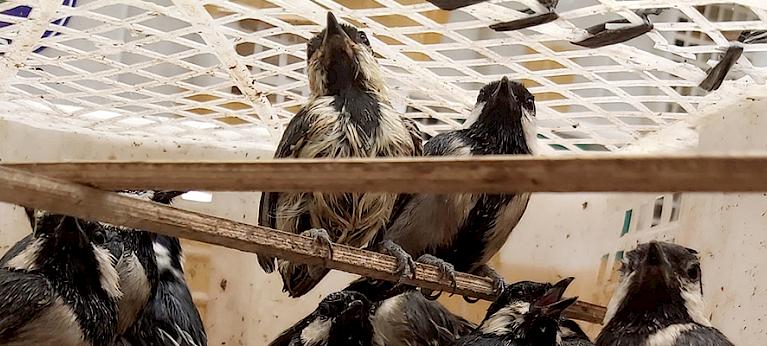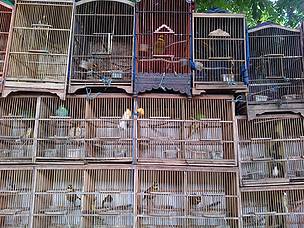- Messages
- 10,369
- Name
- John
- Edit My Images
- Yes
Yet another depressing read regarding birds/animals on the brink of extinction.
This time it relates to the Regent Honeyeater that once thrived in SE Australia.
Originally found within 300km of the coast from Brisbane to Adelaide, the Regent Honeyeater is no longer found in South Australia and records from Queensland are now uncommon. The remaining population in Victoria and NSW is patchy, with little information available on the movement patterns of this highly mobile species.
The usual culprit is the cause. Habitat destruction 85% of their forestry habitat, dry box ironbark open forest and woodland, has been felled to make way for agriculture and urban development. For me,the question is why was that destruction allowed to take place ? A rhetorical question,really. We all know why. Another problem for them is the 'tidying up' of dead and fallen trees, vital for their existence.
There are so few left, estimated at 300 and spread over 100,000 sq miles, so that when the chicks fledge and it's at this point it learns its song from the flocks rather than from its father in the nest ,it's imitating other birds and being rebuffed which means its not attracting females of its own species . Moves are afoot to teach captive-born chicks the call using recordings of the females before they are released into the wild. Research has shown that only 25% of Regent Honeyeaters learnt its own song and one in ten any song of any variety of honeyeater. Research also showed that captive-bred honeyeaters sing a very different song to the wild ones.
There's some hope.Through partnerships between government agencies, non-government organisations, community groups and landholders, efforts are being made to protect the Regent Honeyeater's habitat and ensure this species continues to exist in the wild. Efforts to save the Regent Honeyeater will also help to conserve remnant communities of other threatened or near threatened animals and plants, including the Swift Parrot, Superb Parrot, Brush-tailed Phascogale, Squirrel Glider and Painted Honeyeater.
March 17th. https://www.bbc.co.uk/news/science-environment-56417544
Most recent article April 2021 which takes into account the recent fires and the effect on many bird species https://www.birdlife.org/worldwide/news/ashes-5-birds-affected-australias-bushfires
In general terms another threat is the illegal wild bird trade. This article highlights Java. Between 2018 and 2019 45,000 birds were seized. 11,000 this January alone. No other Asian country has more endangered birds species than Indonesia.

 www.traffic.org
www.traffic.org
July 3rd last year. https://news.mongabay.com/2020/07/t...gbirds-highlights-rampant-trade-in-indonesia/
This paragraph is particularly disturbing in relation to protection and policing measures.
The top destination by far is Java, where keeping songbirds as pets is a popular hobby. It’s a status symbol in Javanese culture and thought to promote peace of mind. Songbirds are also prized for use in contests, which have spawned thriving networks of clubs, online forums and blogs. The country’s president, Joko Widodo, is himself an avid collector of songbirds, which he enters into singing contests. In 2018, he even offered to buy a prize-winning bird worth up to $137,000.
He made a big thing of releasing some of his birds in 2016. He'd bought them from the infamous Pramika market in Jakarta. The law they have to protect wild birds is being ignored.

 wwf.panda.org
wwf.panda.org
To be honest, despite the wonderful efforts of environmental/protection groups I'm very pessimistic regarding the furtherance of world-wide species protection. Too much money is involved leading to corruption and basically, there are too many 'bad' people in influential positions, let alone the top man, it's usually a man,in countries throughout the world. Misplaced 'status' symbols for the wealthy is another problem. Another aspect, an important one, which so often allows bad practice in many areas of life is 'tradition' /'culture'. In Indonesia it's been 'traditional' for centuries to keep these wonderful birds in captivity. So many so-called 'traditional' aspects of life around the world, involving birds/animals is nothing less than cruelty...in some instances extreme cruelty. I'm sure most can readily name some. Re food..shark fin soup comes to mind in Asia, predominantly, China.
It sort of makes one feel ashamed of the human race.
This time it relates to the Regent Honeyeater that once thrived in SE Australia.
Originally found within 300km of the coast from Brisbane to Adelaide, the Regent Honeyeater is no longer found in South Australia and records from Queensland are now uncommon. The remaining population in Victoria and NSW is patchy, with little information available on the movement patterns of this highly mobile species.
The usual culprit is the cause. Habitat destruction 85% of their forestry habitat, dry box ironbark open forest and woodland, has been felled to make way for agriculture and urban development. For me,the question is why was that destruction allowed to take place ? A rhetorical question,really. We all know why. Another problem for them is the 'tidying up' of dead and fallen trees, vital for their existence.
There are so few left, estimated at 300 and spread over 100,000 sq miles, so that when the chicks fledge and it's at this point it learns its song from the flocks rather than from its father in the nest ,it's imitating other birds and being rebuffed which means its not attracting females of its own species . Moves are afoot to teach captive-born chicks the call using recordings of the females before they are released into the wild. Research has shown that only 25% of Regent Honeyeaters learnt its own song and one in ten any song of any variety of honeyeater. Research also showed that captive-bred honeyeaters sing a very different song to the wild ones.
There's some hope.Through partnerships between government agencies, non-government organisations, community groups and landholders, efforts are being made to protect the Regent Honeyeater's habitat and ensure this species continues to exist in the wild. Efforts to save the Regent Honeyeater will also help to conserve remnant communities of other threatened or near threatened animals and plants, including the Swift Parrot, Superb Parrot, Brush-tailed Phascogale, Squirrel Glider and Painted Honeyeater.
March 17th. https://www.bbc.co.uk/news/science-environment-56417544
Most recent article April 2021 which takes into account the recent fires and the effect on many bird species https://www.birdlife.org/worldwide/news/ashes-5-birds-affected-australias-bushfires
In general terms another threat is the illegal wild bird trade. This article highlights Java. Between 2018 and 2019 45,000 birds were seized. 11,000 this January alone. No other Asian country has more endangered birds species than Indonesia.

Indonesia kicks off 2021 with a bumper crop of bird seizures - Wildlife Trade News from TRAFFIC
A new year has shown no let up in Indonesian authorities’ efforts to save wild birds, with more than 11,000 wild birds seized in January 2021 alone. ...
July 3rd last year. https://news.mongabay.com/2020/07/t...gbirds-highlights-rampant-trade-in-indonesia/
This paragraph is particularly disturbing in relation to protection and policing measures.
The top destination by far is Java, where keeping songbirds as pets is a popular hobby. It’s a status symbol in Javanese culture and thought to promote peace of mind. Songbirds are also prized for use in contests, which have spawned thriving networks of clubs, online forums and blogs. The country’s president, Joko Widodo, is himself an avid collector of songbirds, which he enters into singing contests. In 2018, he even offered to buy a prize-winning bird worth up to $137,000.
He made a big thing of releasing some of his birds in 2016. He'd bought them from the infamous Pramika market in Jakarta. The law they have to protect wild birds is being ignored.

Tens of thousands of birds sold illegally on streets of Jakarta
Thriving illegal trade threatens numerous bird species in Indonesia
To be honest, despite the wonderful efforts of environmental/protection groups I'm very pessimistic regarding the furtherance of world-wide species protection. Too much money is involved leading to corruption and basically, there are too many 'bad' people in influential positions, let alone the top man, it's usually a man,in countries throughout the world. Misplaced 'status' symbols for the wealthy is another problem. Another aspect, an important one, which so often allows bad practice in many areas of life is 'tradition' /'culture'. In Indonesia it's been 'traditional' for centuries to keep these wonderful birds in captivity. So many so-called 'traditional' aspects of life around the world, involving birds/animals is nothing less than cruelty...in some instances extreme cruelty. I'm sure most can readily name some. Re food..shark fin soup comes to mind in Asia, predominantly, China.
It sort of makes one feel ashamed of the human race.

